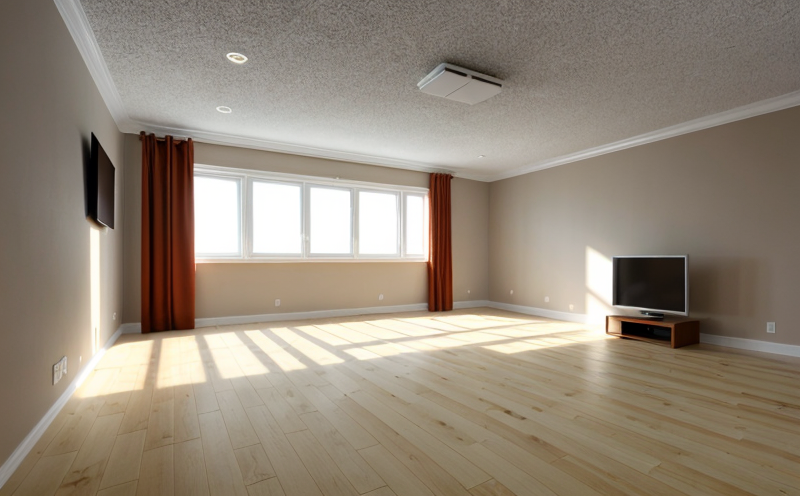ASTM E1332-10 Building Facade Insulation Classification
The ASTM E1332-10 standard provides a comprehensive approach to the classification of building facade insulation. This method is crucial for ensuring that the insulating materials used in construction meet specific performance criteria, thereby contributing to energy efficiency and thermal comfort within buildings.
Building facades play a significant role in managing heat transfer between the interior and exterior environments. Insulation plays an essential part in this process by reducing unwanted heat loss or gain. ASTM E1332-10 outlines a standardized procedure for evaluating insulation performance, which includes thermal resistance (R-value), moisture resistance, and durability under various environmental conditions.
The testing protocol described within the standard involves subjecting samples of facade insulation to controlled environments designed to mimic real-world exposure. This ensures that the materials perform consistently across different climates and conditions. Compliance with ASTM E1332-10 is important for architects, engineers, and building owners who aim to construct energy-efficient structures while adhering to local regulations.
Real-world applications of this standard extend beyond mere compliance; they also contribute significantly to sustainability goals set by organizations like the LEED (Leadership in Energy and Environmental Design) certification program. By ensuring that facade insulation meets stringent criteria, we help create more sustainable buildings that reduce carbon footprints.
Furthermore, ASTM E1332-10 serves as a benchmark for quality control during manufacturing processes. Manufacturers can use the results from these tests to improve product design and performance continuously. For buyers seeking high-quality insulation products, adherence to this standard offers peace of mind regarding material integrity over time.
In summary, ASTM E1332-10 is vital not only for regulatory compliance but also for promoting sustainable practices in construction. It provides a robust framework that supports both environmental responsibility and functional performance expectations for building facades.
Scope and Methodology
The scope of ASTM E1332-10 encompasses the evaluation of insulation materials used in exterior walls, roofs, and floors of buildings. The primary focus is on determining the thermal resistance (R-value) and moisture resistance properties of these materials.
- Thermal Resistance Testing: Samples are exposed to controlled temperature differences to measure their ability to resist heat flow.
- Moisture Resistance Testing: Specimens undergo exposure to humidity cycles to assess their susceptibility to water damage.
The methodology involves precise sample preparation, which includes cutting rectangular sections from larger sheets of insulation material. These samples must be free from defects that could affect the test results.
After preparation, specimens are placed into a climate chamber where they undergo standardized temperature and humidity cycles representative of typical outdoor conditions throughout North America. The R-values are calculated based on heat transfer measurements taken during this period.
The ASTM E1332-10 standard also addresses the importance of proper installation techniques to maximize insulation performance. Proper placement, sealing around edges, and minimizing gaps all contribute significantly to overall thermal efficiency. Compliance with these guidelines ensures that the full benefits of insulated facades are realized.
Eurolab Advantages
EuroLab offers unparalleled expertise in ASTM E1332-10 testing, providing clients with accurate and reliable results. Our state-of-the-art facilities and experienced staff ensure that every test follows the strictest protocols outlined by the standard.
Our laboratories are equipped with advanced instrumentation capable of measuring extremely precise R-values, even for small or irregularly shaped samples. This level of accuracy is crucial when assessing complex building envelopes where slight variations in insulation performance can have significant impacts on energy efficiency.
We offer flexible scheduling options to accommodate your project timeline while maintaining our high standards of quality control and data integrity. Whether you need one-off tests or ongoing monitoring, EuroLab provides the personalized service required for successful outcomes.
Our commitment to excellence extends beyond technical proficiency; we also prioritize customer satisfaction by offering clear communication throughout each stage of testing. From initial consultation through final report delivery, our goal is to make your experience as seamless as possible.
Quality and Reliability Assurance
EuroLab maintains a rigorous quality assurance program to ensure all ASTM E1332-10 testing meets the highest standards. Our processes include:
- Regular calibration of test equipment to traceable national standards.
- Stricter adherence to ISO/IEC 17025 accreditation requirements for laboratory management systems and technical operations.
- Detailed documentation of each testing procedure, including environmental conditions during sample exposure.
We continuously monitor our performance through internal audits and external evaluations by independent bodies. This commitment to excellence guarantees that every result is reliable and accurate.





